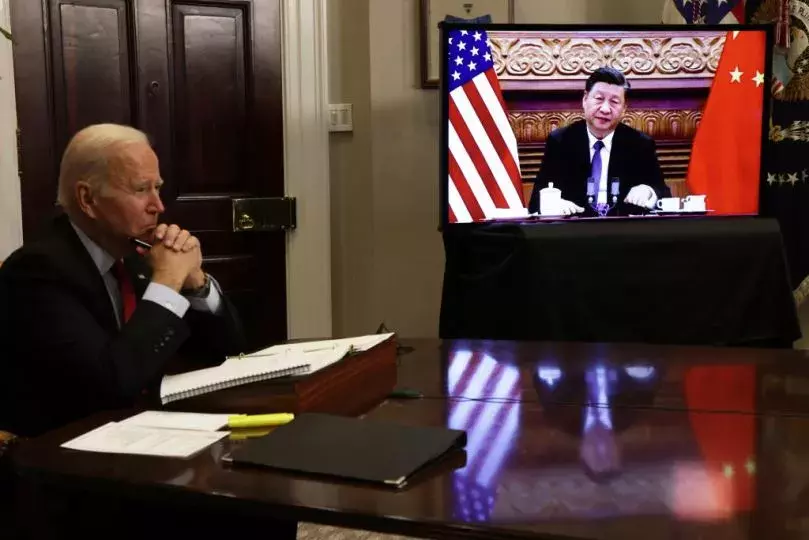Error message

Former top US diplomat for Asia David Stilwell cautions against one-sided overtures to Beijing
Part 2 of a series on the pros and cons of reengagement with China. Read part 1, ‘Situational Engagement’
Quick take:
- With US-China relations at a 30-year low, the US must insist that China be a committed dialogue partner before launching a new engagement initiative.
- Beijing will test America’s appetite for engagement to see what it can extract.
- Ultimately, Beijing will only enter a useful dialogue when it determines that it is in its best interest.
HONOLULU (Dec. 21, 2021) -- With the US-China relationship currently at a low point not seen for over 30 years, former top US diplomat for Asia David Stilwell cautioned in a recent East-West Center China Seminar talk that US officials should not seek to reengage with China simply for engagement’s sake. Instead, he said, it is essential for policymakers to be fully cognizant of serious differences with China about what engagement means and how it is implemented. (Stilwell, an alumnus and former fellow of the East-West Center, is currently a federally appointed member of the Honolulu-based international exchange institution’s Board of Governors.)
A retired Air Force brigadier general who served as assistant secretary of state for Asia and the Pacific during the Trump administration and has been personally involved in negotiations with China for decades, Stilwell quoted expert Grant Newsham in saying that it is “a uniquely American conceit that if we can just get to the table with these guys, if we just talk to them, they will see it our way.” In fact, he said, engagement only makes sense when both sides are prepared to listen and understand each other’s expectations.
Testing America’s appetite for engagement
Americans tend to seek one-on-one meetings to get to the heart of an issue, Stilwell said, while the Chinese prefer lavish banquets. Americans will impatiently make an early concession to demonstrate good faith in order to conclude negotiations quickly while the Chinese wait for the best time to engage. And on a purely practical level, American negotiators turn over every few years while Chinese representatives spend decades in the same position.
Most importantly, Stilwell argued, American negotiators believe that you build trust over time by following through on promises. Chinese negotiators, on the other hand, “will sign agreements, but they will not be bound by them,” he said, citing the recent example of Beijing summarily abolishing many of the civil liberties guarantees in its agreement with the United Kingdom over the 1997 handover of Hong Kong, even calling that agreement “scraps of paper.”
China is always testing America’s appetite for engagement to see what it can extract, Stilwell said, and any eagerness is interpreted as weakness. One example came earlier this year when US Special Climate Envoy John Kerry flew to China, ostensibly for face-to-face meetings with a counterpart in Beijing. Instead, he got only as far as Tianjin and the sessions were conducted via video conference. “Chinese media were thus able to paint the US as weak and beholden,” Stilwell said, “with China having the upper hand.”
False sense of security
Negotiations can even result in a false sense of security, he said: “If you're having talks but you're not getting at the issues, those issues continue to fester and get worse while people believe they're being addressed—and that can lead to a bad outcome.”
Conversely, not talking can sometimes be a positive sign. Stilwell noted that before China’s entry into the Korean War it made diplomatic overtures that the US ignored. In the current context, he said, the fact that China has not sought to engage over Taiwan may in fact be an indicator that Beijing doesn’t intend to take military action anytime soon.
It’s essential that the US demonstrate patience, set measurable objectives and demand serious engagement, Stilwell said. Although it might be possible to nudge China toward engagement through improved public diplomacy efforts, in the end Beijing will only enter a useful dialogue when it determines that it is in its best interest.
Watch the full China Seminar event with General David Stilwell:
Photo: US President Joe Biden participates in a virtual meeting with Chinese President Xi Jinping, November 15, 2021. Credit: Alex Wong/Getty Images
Former top US diplomat for Asia David Stilwell cautions against one-sided overtures to Beijing
Part 2 of a series on the pros and cons of reengagement with China. Read part 1, ‘Situational Engagement’
Quick take:
- With US-China relations at a 30-year low, the US must insist that China be a committed dialogue partner before launching a new engagement initiative.
- Beijing will test America’s appetite for engagement to see what it can extract.
- Ultimately, Beijing will only enter a useful dialogue when it determines that it is in its best interest.
HONOLULU (Dec. 21, 2021) -- With the US-China relationship currently at a low point not seen for over 30 years, former top US diplomat for Asia David Stilwell cautioned in a recent East-West Center China Seminar talk that US officials should not seek to reengage with China simply for engagement’s sake. Instead, he said, it is essential for policymakers to be fully cognizant of serious differences with China about what engagement means and how it is implemented. (Stilwell, an alumnus and former fellow of the East-West Center, is currently a federally appointed member of the Honolulu-based international exchange institution’s Board of Governors.)
A retired Air Force brigadier general who served as assistant secretary of state for Asia and the Pacific during the Trump administration and has been personally involved in negotiations with China for decades, Stilwell quoted expert Grant Newsham in saying that it is “a uniquely American conceit that if we can just get to the table with these guys, if we just talk to them, they will see it our way.” In fact, he said, engagement only makes sense when both sides are prepared to listen and understand each other’s expectations.
Testing America’s appetite for engagement
Americans tend to seek one-on-one meetings to get to the heart of an issue, Stilwell said, while the Chinese prefer lavish banquets. Americans will impatiently make an early concession to demonstrate good faith in order to conclude negotiations quickly while the Chinese wait for the best time to engage. And on a purely practical level, American negotiators turn over every few years while Chinese representatives spend decades in the same position.
Most importantly, Stilwell argued, American negotiators believe that you build trust over time by following through on promises. Chinese negotiators, on the other hand, “will sign agreements, but they will not be bound by them,” he said, citing the recent example of Beijing summarily abolishing many of the civil liberties guarantees in its agreement with the United Kingdom over the 1997 handover of Hong Kong, even calling that agreement “scraps of paper.”
China is always testing America’s appetite for engagement to see what it can extract, Stilwell said, and any eagerness is interpreted as weakness. One example came earlier this year when US Special Climate Envoy John Kerry flew to China, ostensibly for face-to-face meetings with a counterpart in Beijing. Instead, he got only as far as Tianjin and the sessions were conducted via video conference. “Chinese media were thus able to paint the US as weak and beholden,” Stilwell said, “with China having the upper hand.”
False sense of security
Negotiations can even result in a false sense of security, he said: “If you're having talks but you're not getting at the issues, those issues continue to fester and get worse while people believe they're being addressed—and that can lead to a bad outcome.”
Conversely, not talking can sometimes be a positive sign. Stilwell noted that before China’s entry into the Korean War it made diplomatic overtures that the US ignored. In the current context, he said, the fact that China has not sought to engage over Taiwan may in fact be an indicator that Beijing doesn’t intend to take military action anytime soon.
It’s essential that the US demonstrate patience, set measurable objectives and demand serious engagement, Stilwell said. Although it might be possible to nudge China toward engagement through improved public diplomacy efforts, in the end Beijing will only enter a useful dialogue when it determines that it is in its best interest.
Watch the full China Seminar event with General David Stilwell:
Photo: US President Joe Biden participates in a virtual meeting with Chinese President Xi Jinping, November 15, 2021. Credit: Alex Wong/Getty Images
East-West Wire
News, Commentary, and Analysis
The East-West Wire is a news, commentary, and analysis service provided by the East-West Center in Honolulu. Any part or all of the Wire content may be used by media with attribution to the East-West Center or the person quoted. To receive East-West Center Wire media releases via email, subscribe here.
For links to all East-West Center media programs, fellowships and services, see www.eastwestcenter.org/journalists.







